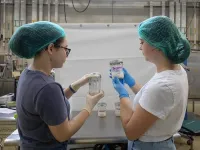(Press-News.org) In southern Germany just north of the Danube, there lies a large circular depression between the hilly surroundings: the Nördlinger Ries. Almost 15 million years ago, an asteroid struck this spot. Today, the impact crater is one of the most useful analogues for asteroid craters on early Mars. Studying the deposits of the former lake that formed in the crater is particularly informative. These deposits have been of great interest ever since NASA began exploring Martian craters for signs of water and life on Mars. However, the chemical development of the former crater lake and its habitable areas is only partially understood. An international research team led by the University of Göttingen have now uncovered clues about the past: they analysed dolomite rocks in a drill core and found an extremely high proportion of the carbon isotope C-13. Further investigations traced this back to a phase of strong methane formation by microorganisms known as archaea in water with a low sulphate content. In contrast, the sediments of the previous, first phase of the crater lake showed clear traces of high sulphate content and bacterial sulphate decomposition. This change reveals that the groundwater pathways to the lake changed as the crater floor cooled. The results have been published in the journal Geochimica et Cosmochimica Acta.
A 250-metre-long drill core taken in 1981 provided information about the chemical processes during the time periods that sediment was being deposited in the crater lake. Combining sedimentological, biogeochemical and isotope geochemical research methods enabled the researchers to identify a distinctive section, which they investigated in more detail using biomarker analyses. They detected organic biomarkers originating from sulphate-reducing bacteria and "normal" dolomite in older rocks from the crater lake. In the younger rocks, they found dolomite enriched with C-13 and a chemical called archaeol which indicates that archaea were present at that time.
The properties of the rocks reflect the conditions in the crater lake during their formation: the decrease in sulphate is due to degradation by bacteria and the C-13 enrichment is due to the formation of methane by archaea. "This chemical development can only be explained by the change in the groundwater supply during the gradual cooling of the crater floor. This led to a change from deep, hydrothermal groundwater (with sulphate) to cooler water without sulphate that must have flowed through limestone rocks near to the surface," explains study leader Professor Gernot Arp from the Department of Geobiology at the University of Göttingen.
The findings not only provide important information on the development of the crater lake being investigated, but also, as Arp notes: "Our findings show that the conditions in asteroid crater lakes are strongly controlled by internal processes such as crater floor cooling and water supply. In contrast, climatic changes are of secondary importance, unlike in many other lakes. This must be taken into account when deposits in terrestrial and extraterrestrial craters are used as climate archives to deduce past climate conditions from the sediments."
Original publication: Zeng L. et al. (2023): Extremely 13C-enriched dolomite records interval of strong methanogenesis following a sulfate decline in the Miocene Ries impact crater lake. Geochimica et Cosmochimica Acta. DOI: 10.1016/j.gca.2023.10.013
Contact:
Professor Gernot Arp
University of Göttingen
Geosciences Centre
Department of Geobiology
Goldschmidtstraße 3, 37077 Göttingen, Germany
Tel: +49 (0)551 39-7986
Email: garp@gwdg.de
www.uni-goettingen.de/en/646903.html
Dr Lingqi Zeng
Purdue University, Indiana
Planetary Surface Processes Research Group
Email: zeng291@purdue.edu
www.eaps.purdue.edu/horgan/people.html#Researchers
END
Limitations of asteroid crater lakes as climate archives
Researchers led by Göttingen University determine factors for chemical development in crater lakes on Earth
2023-12-05
ELSE PRESS RELEASES FROM THIS DATE:
AAAS announces addition of Biomaterials Research to Science Partner Journal program
2023-12-05
The American Association for the Advancement of Science (AAAS) is pleased to announce its partnership with the Korean Society for Biomaterials (KSBM) to publish Biomaterials Research as a Science Partner Journal.
Biomaterials Research’s mission is to contribute to the development of the global biomaterials field and the benefit of the community and people through the expansion of international collaboration. The journal welcomes submissions from interdisciplinary fields of biomaterials research, including novel biomaterials, cutting-edge technologies of biomaterials synthesis and fabrication, ...
Picking up good vibrations: The surprising physics of the didjeridu #Acoustics23
2023-12-05
SYDNEY, Dec. 6, 2023 – Australia’s most iconic sound is almost certainly the didjeridu. The long wooden tube-shaped instrument is famous for its unique droning music and has played a significant role in Australian Aboriginal culture for thousands of years. Despite the instrument’s simple design, the playing technique can be highly complex.
Joe Wolfe and John Smith from the University of New South Wales conducted acoustic experiments to study the didjeridu’s unusual and complicated performance techniques. Smith will be presenting their work on Dec. 6 at 8:20 a.m. Australian Eastern Daylight Time, as part of Acoustics 2023 Sydney, ...
Bacteria's mucus maneuvers: Study reveals how snot facilitates infection
2023-12-05
UNIVERSITY PARK, Pa. — Sniffles, snorts and blows of runny noses are the hallmarks of cold and flu season — and that increase in mucus is exactly what bacteria use to mount a coordinated attack on the immune system, according to a new study from researchers at Penn State. The team found that the thicker the mucus, the better the bacteria are able to swarm. The findings could have implications for treatments that reduce the ability of bacteria to spread.
The study, recently published in the journal PNAS Nexus, demonstrates how bacteria ...
Shuqing Xu receives ERC Consolidator Grant for his research on the evolution in ecological communities in response to climate change
2023-12-05
Eating or being eaten, competing for resources – these are certainly the best-known interactions among organisms coexisting in an ecosystem, but they are by no means the only ones. In fact, different species live together and interact in complex ways. But how do different species evolve or coevolve in a community as temperatures rise due to climate change? Current research focuses primarily on how individual species react to climate change. However, as species interact with each other in the ecosystem, the evolutionary responses to climate change are difficult to predict from studying each species in isolation. For example, a plant may grow faster due ...
Study of sourdough starter microbiomes to boost bread quality and safety
2023-12-05
UNIVERSITY PARK, Pa. — People with celiac disease, or intolerance to dietary gluten, may soon have more food options, thanks to an unlikely source: sourdough bread. Sourdough contains less gluten than other breads, making it more tolerable for people with gluten sensitivities. Now, Penn State and Colorado State University researchers are studying whether bacteria in the yeast starter needed to make sourdough bread might help reduce gluten in other bread products.
Gluten is a protein naturally found in cereal grains such as wheat, barley and rye that can trigger an ...
UT receives National Institute of Justice awards for forensics research
2023-12-05
The Forensic Anthropology Center at the University of Tennessee, Knoxville, has received two grants totaling over $580,000 from the Office of Justice Program’s National Institute of Justice, the research, development and evaluation agency of the U.S. Department of Justice. A longtime grantee across numerous forensics research topics, the center – which includes the Anthropological Research Facility, also known as the Body Farm – is known worldwide for its research and training.
The first of the two new research projects will help law enforcement locate clandestine graves, and the second will help inform how relic DNA in the soil affects forensic ...
Newly identified biomarkers may detect early cognitive decline via blood test
2023-12-05
UNIVERSITY PARK, Pa. — For some people, extreme stressors like psychiatric disorders or childhood neglect and abuse can lead to a range of health problems later in life, including depression, anxiety and cardiovascular disease. A new study led by researchers in the Penn State Center for Healthy Aging identified genetic indicators that can predict another health problem, the decline of cognitive abilities, among people who have been affected by these extreme stressors.
The team recently published their findings ...
Researchers predict climate change-driven reduction in beneficial plant microbes
2023-12-05
UNIVERSITY PARK, Pa. — Bacteria that benefit plants are thought to be a critical contributor to crops and other ecosystems, but climate change may reduce their numbers, according to a new study by an international team of researchers. They published their findings in Nature Food.
The collaboration, including Francisco Dini-Andreote, professor of plant science at Penn State, characterized the abundances and distributions of plant beneficial bacteria (PBB) from soils collected across the globe. The researchers ...
Addicted to your phone? New tool identifies overuse of digital media
2023-12-05
BINGHAMTON, N.Y. -- The rapidly evolving nature of digital media presents a challenge for those who study digital addiction – social networks like TikTok and video games like Fortnite might be popular now, but they could be irrelevant in a matter of years. A new tool developed by researchers from Binghamton University, State University of New York will make it easier for clinicians and researchers to measure digital media addiction as new technologies emerge.
“We wanted to create a tool that was immediately useful in the clinic and lab, that reflects current understandings about how digital addiction works, that wouldn't go obsolete once the next big tech ...
International consensus report on gaps and opportunities for the clinical translation of precision diabetes medicine
2023-12-05
Boston, MA - A new international consensus report on precision medicine in diabetes prevention and care highlights the significant advancements in precision medicine in diabetes prevention, diagnosis, treatment, and prognosis while also shedding light on numerous knowledge gaps.
The report, Second international consensus report on gaps and opportunities for the clinical translation of precision diabetes medicine, was published in Nature Medicine on October 5, 2023.
Supported by the American Diabetes Association (ADA), the European Association for the Study of Diabetes (EASD), and the Novo Nordisk Foundation, the consensus report was made possible through a huge collaborative ...
LAST 30 PRESS RELEASES:
Tundra tongue: The science behind a very cold mistake
Targeting a dangerous gut infection
Scientists successfully harvest chickpeas from “moon dirt”
Teen aggression a warning sign for faster aging later in life
Study confirms food fortification is highly cost-effective in fighting hidden hunger across 63 countries
Special issue elevates disease ecology in marine management
A kaleidoscope of cosmic collisions: the new catalogue of gravitational signals from LIGO, Virgo and KAGRA
New catalog more than doubles the number of gravitational-wave detections made by LIGO, Virgo, and KAGRA observatories
Antifibrotic drug shows promise for premature ovarian insufficiency
Altered copper metabolism is a crucial factor in inflammatory bone diseases
Real-time imaging of microplastics in the body improves understanding of health risks
Reconstructing the world’s ant diversity in 3D
UMD entomologist helps bring the world’s ant diversity to life in 3D imagery
ESA’s Mars orbiters watch solar superstorm hit the Red Planet
The secret lives of catalysts: How microscopic networks power reactions
Molecular ‘catapult’ fires electrons at the limits of physics
Researcher finds evidence supporting sucrose can help manage painful procedures in infants
New study identifies key factors supporting indigenous well-being
Bureaucracy Index 2026: Business sector hit hardest
ECMWF’s portable global forecasting model OpenIFS now available for all
Yale study challenges notion that aging means decline, finds many older adults improve over time
Korean researchers enable early detection of brain disorders with a single drop of saliva!
Swipe right, but safer
Duke-NUS scientists identify more effective way to detect poultry viruses in live markets
Low-intensity treadmill exercise preconditioning mitigates post-stroke injury in mouse models
How moss helped solve a grave-robbing mystery
How much sleep do teens get? Six-seven hours.
Patients regain weight rapidly after stopping weight loss drugs – but still keep off a quarter of weight lost
GLP-1 diabetes drugs linked to reduced risk of addiction and substance-related death
Councils face industry legal threats for campaigns warning against wood burning stoves
[Press-News.org] Limitations of asteroid crater lakes as climate archivesResearchers led by Göttingen University determine factors for chemical development in crater lakes on Earth






